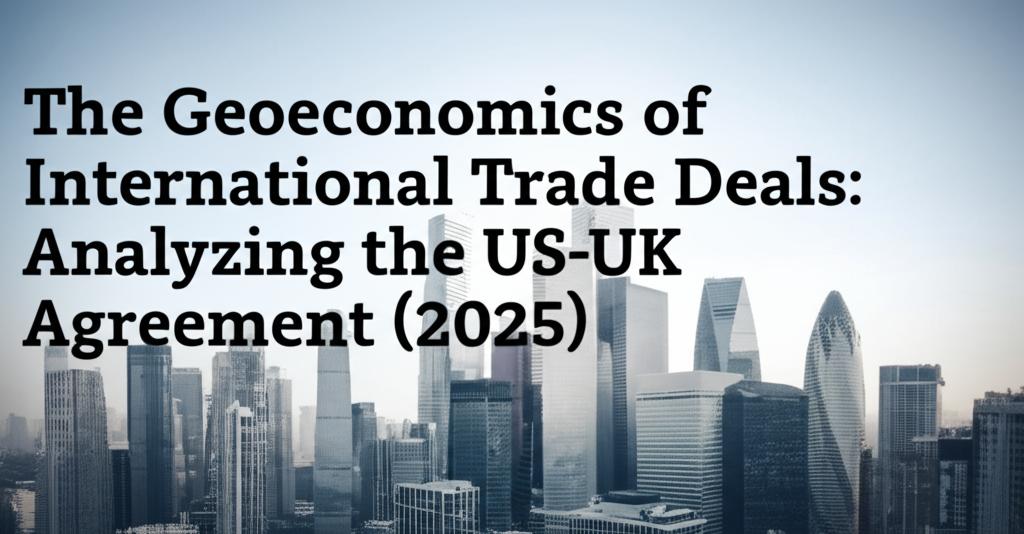The evolving global landscape, marked by shifting economic power, technological disruption, and heightened geopolitical competition, has brought the strategic importance of international trade agreements into sharp focus. Against this backdrop, the pursuit and potential contours of a US-UK trade understanding in 2025 offer a compelling case study in modern geoeconomics. While aspirations for a comprehensive free trade agreement (FTA) have been a long-standing feature of the post-Brexit dialogue, the current approach appears more nuanced, possibly reflecting a series of targeted initiatives and agreements designed to foster closer economic ties and address contemporary challenges.
The Evolving Framework of US-UK Economic CooperationIn 2025, the economic partnership between the United States and the United Kingdom continues to be a cornerstone for both nations, built on deep historical ties, substantial two-way investment, and significant trade flows, particularly in services and high-tech industries. Following the UK's departure from the European Union, the ambition for a comprehensive FTA with the US was high. However, various factors, including differing regulatory approaches in areas like agriculture and data, alongside shifting political priorities on both sides of the Atlantic, have led to a more incremental and strategic approach.
Recent years have seen a pivot towards more flexible and targeted mechanisms. Initiatives like the "Atlantic Declaration for a Twenty-First Century U.S.-UK Economic Partnership," announced in 2023, laid the groundwork for closer cooperation on pressing economic issues. This includes strengthening supply chain resilience, particularly for critical minerals, advancing cooperation on emerging technologies like artificial intelligence (AI) and quantum computing, promoting digital trade, and investing in clean energy. Furthermore, the UK has actively pursued Memoranda of Understanding (MOUs) with individual US states, aiming to reduce trade barriers and foster collaboration at a sub-national level, demonstrating a pragmatic approach to enhancing economic links in the absence of a sweeping federal FTA.
Geoeconomic Imperatives and Strategic GoalsFor the United Kingdom, deepening its trade and investment relationship with the US in 2025 is a key component of its "Global Britain" strategy. The geoeconomic goals are multifaceted:
- Diversification and Market Access: Securing more favorable access to the large and dynamic US market is crucial for UK businesses, helping to diversify trade relationships beyond Europe.
- Boosting Key Sectors: The UK aims to leverage its strengths in services (financial, legal, professional), digital economy, life sciences, and green technologies through enhanced cooperation.
- Attracting Investment: A closer economic partnership can solidify the UK's position as an attractive destination for US investment, fostering innovation and job creation.
- Regulatory Influence: Collaborating on new regulatory frameworks, especially in digital trade and emerging technologies, allows the UK to help shape global norms.
For the United States, the geoeconomic rationale for strengthening ties with the UK in 2025 aligns with broader strategic objectives:
- Alliance Reinforcement: In an era of increasing strategic competition, bolstering economic ties with a key ally like the UK strengthens the transatlantic partnership and collective economic security.
- Countering Geopolitical Rivals: Enhanced US-UK cooperation, particularly in technology standards, supply chain security for critical goods (like semiconductors and rare earths), and digital governance, can serve as a counterweight to the influence of strategic competitors.
- Promoting Shared Values: Working with the UK to champion free and fair trade, an open digital economy, and high labor and environmental standards reinforces these values on the global stage.
- Economic Benefits: While the US economy is vast, targeted agreements can still yield benefits for specific sectors, promote innovation, and support American jobs, especially through increased exports and inward investment from the UK.
A "US-UK Agreement (2025)" is likely to encompass a series of understandings rather than a single, all-encompassing treaty. Key areas of focus would likely include:
- Digital Trade: Facilitating cross-border data flows, ensuring non-discriminatory treatment of digital products, promoting cooperation on AI governance, and addressing cybersecurity threats.
- Critical Minerals and Supply Chain Resilience: Joint initiatives to secure and diversify supply chains for minerals essential for green technologies and defense, reducing dependence on single sources.
- Regulatory Cooperation: Streamlining regulatory processes and enhancing mutual recognition in specific sectors to reduce non-tariff barriers, particularly for small and medium-sized enterprises (SMEs).
- Services: Further liberalizing trade in services, where both economies have significant strengths, including financial services, professional and business services, and education.
- Clean Energy and Green Technology: Promoting investment and collaboration in renewable energy, carbon capture technologies, and sustainable industries to support climate goals and energy security.
- Support for SMEs: Provisions specifically designed to make it easier for smaller businesses in both countries to engage in transatlantic trade.
Despite the mutual benefits, challenges remain. Aligning divergent regulatory standards, particularly concerning agricultural products (e.g., sanitary and phytosanitary measures) and data privacy, requires careful negotiation. Domestic political considerations in both nations also play a significant role in shaping the scope and pace of any agreements.
Looking ahead, the US-UK economic relationship in 2025 is characterized by a pragmatic and strategic evolution. While a comprehensive FTA may remain an eventual goal, the current focus on targeted agreements, regulatory cooperation, and joint initiatives in areas of shared geoeconomic and strategic importance demonstrates a flexible approach. This evolving partnership not only seeks to unlock economic benefits for both nations but also to fortify their alliance in navigating a complex and rapidly changing global order. The success of these efforts will be crucial in shaping their respective economic futures and their collective influence on the international stage.

